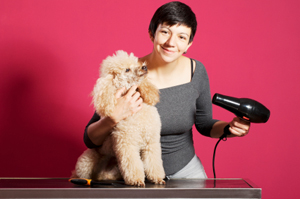Get The 'Straight From Salon' Look For Your Pet

Is your pet a little scruffy? Follow our eight-step plan to smarten them up.
1 MORE OR LESS?
Short-haired cats usually need to be brushed once or twice a week, but long-haired felines, exotic shorthairs and moulting moggies need daily grooming. Older cats or those that are unwell need more help, too. All dogs benefit from daily grooming. Use a wire 'slicker' brush every day on silky and long-haired breeds. Non-shedding, curly haired dogs need daily grooming and professional clipping every few months. Wiry types need regular brushing and occasional professional grooming or 'stripping', while smooth-coated dogs just need a daily once-over with a soft brush or 'hound glove'. Rabbits need weekly brushing, but make it daily if he's shedding or a long-haired breed such as an Angora.
2 BRUSH UP
Brushing your pet removes dirt, grease, dead hair and skin flakes, as well as stimulating blood circulation. Cat expert Vicky Halls advises using a fine-toothed comb to check for flea poo, then massaging from tail to head to loosen dead hairs and using a rubber grooming glove or wide-toothed comb to remove them. Check between toes and pads for mats. For dogs, use a brush suitable for his coat and work in the direction of hair growth. Nicky Mills of the Guild of Master Groomers adds: 'Be methodical so you don't miss anywhere. Work from the paw upwards and finish one leg before moving onto the next.' Once your rabbit is shedding, you can often remove lots of hair by just gently pulling it out with your hands.
3 HEART OF DE-MATTER
Nicky Mills says: 'Use dog conditioning sprays to make mats easier to untangle, and gently brush away from the skin, holding the mat at the base.' On long-haired cats, use a wide-toothed comb or rubber mitten, taking special care under her 'armpits' and between her hind legs. Tease out knots with your fingers. Don't use scissors. Be similarly gentle with rabbits and use a mat rake to take the mass apart. If you have grooming queries, ask your vet.
4 PAWS AND CLAWS
Cats, dogs and indoor rabbits need their nails trimmed to stop them becoming long and uncomfortable. With light-coloured nails and claws, it's easy to avoid the sensitive pink quick and snip off the white nail tip. With dark-coloured nails, it can be harder. It's always a good idea to consult your vet or groomer before you do this; it's a tricky operation and often best left to the pros.
5 LOOK AND LISTEN
Gently wipe each eye with a separate cotton wool ball moistened with water. See your vet if your pet's eyes look runny, sticky or sore, and look out for foreign bodies such as grass seeds. Clean ears in the same way, but never insert anything, not even cotton buds, into them. Lots of earwax and/or persistent head-shaking could indicate infection or ear mites.
6 WHAT'S BEHIND THE WHIFF?
If you notice a bad smell around your dog's rear, his anal glands could have become blocked. Emptying them is probably best left to the professionals! Rabbits need daily checking to make sure their bottoms are clean and dry. They also have scent glands either side of their genitals, which you can clean gently with a damp cotton bud.
7 A BIGGER SPLASH
How often your dog needs a bath will depend on his breed. As Nicky Mills says: 'A white, fluffy Bichon Frise might need a bath once a month, a Labrador twice a year.' The Dogs Trust advises always using lukewarm water and a special dog shampoo, making sure you avoid his ears and eyes, and rinsing the shampoo thoroughly. In the wintertime, dry him well to help prevent him getting a chill.
8 BECAUSE HE'S WORTH IT
Nicky Mills says: 'It's essential for owners to regularly maintain their pets' coats but a quality groomer can do a better job than you can do at home. So bring him to a professional groomer for a nice bath, cut and style. We also give really good health checks as we know what to look out for.'
Do you have any top tips or stories about grooming your pet? We'd love to hear from you (just comment below).

